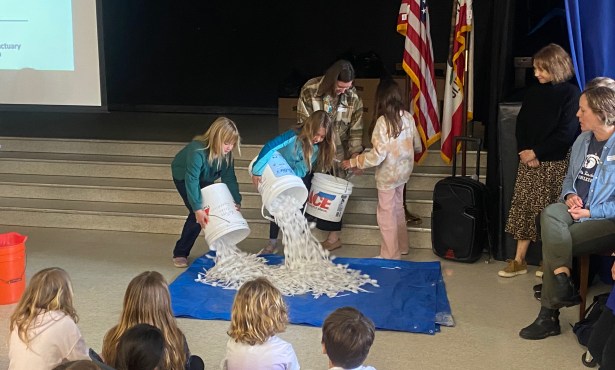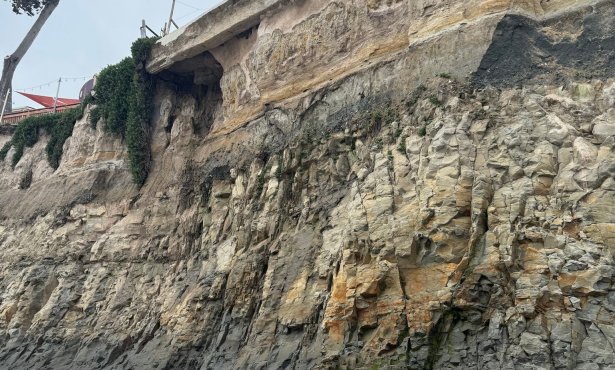A Heavenly Journey to Hell and Back
Two Men, Six Cities, One Goal: Homeless in America
by Sarah Hammill
If you had passed by recent Westmont graduate Mike Yankoski on
the streets of San Francisco three years ago, chances are you
wouldn’t have noticed him. If you had, it wouldn’t have been
because of his curly mop of brown hair, the friendly eyes that
smile out from behind his glasses, or his classic surfer T-shirt
and flip-flops. From the spring through the fall of 2003,
Yankoski’s most noticeable features were likely the smell of urine
and dirt, the constant strain of worship music he and his friend
Sam Purvis played for spare change, or the backpack Yankoski
carried, stuffed to the brim with all he owned. And yet, three
years later, Yankoski is a college graduate, a married man, and a
published author of Under the Overpass: A Journey of Faith on the
Streets of America, an account of his experiences as a homeless
man. On the surface, it’s an unlikely trajectory — from college to
the streets, then back to college — but Yankoski is, in many ways,
an unlikely guy, and his journey to street life began in the most
unusual of places. I sat down with him over coffee to get the
story.
It was a sunny Sunday morning that changed Yankoski’s life
forever. He was sitting in a pew at Goleta Community Covenant
Church, listening to a sermon on being the Christian you say you
are, when he felt his heartstrings begin to be tugged. “I sat there
in church struggling to remember a time when I’d actually needed to
lean fully on Christ rather than my own abilities,” Yankoski writes
in Under the Overpass. “The picture that came with that question
was of me homeless and hungry on the streets of America.” He walked
back out into the sunshine that day a changed man.
Convinced of his purpose, Yankoski began to plan his journey,
assembling a team of advisors that included Westmont’s campus
pastor and the directors of the Santa Barbara and Denver rescue
missions, among others. Together, they came up with a clearly
stated mission for Yankoski’s journey: to gain a better
understanding of homelessness in America, encourage other
Christians to live their faith in challenging ways, and learn to
depend more fully on Christ. Most who learned of his plan were
supportive, though wary at first, and virtually all were in
agreement that Yankoski would be much safer with someone to
accompany him. And yet, as the departure date drew near, Yankoski
was still without a traveling partner. “I wanted to go with
somebody but it became February and I started saying to my
advisors, ‘I think I’m gonna have to go this alone.’”
A month later he met Purvis, and in just a few short weeks, the
two departed for Denver, the first of six cities they would visit
and the only city where the two did not spend their time together.
At the advice of the Denver Rescue Mission’s president, Yankoski
eased into street life by living at the inner city location, while
Purvis took up residence at The Farm, a work facility for
rehabilitating homeless people. “It wouldn’t have been weird if one
of us came in [to the rehab facilities], but if both of us came in
who were significantly younger than the other guys, then it would
raise more eyebrows,” Yankoski explained. After 31 days of learning
street lingo, seeing firsthand the effects of addiction, and
witnessing the struggles of men fighting for a new place in
society, Yankoski and Purvis were ready for their real journey:
life without the protection of security guards, daylong stretches
with no promise of food, and the wide open sky as their canopy.
The two men packed only the necessities for their trip,
including for each a pair of underwear, shorts, and jeans, a
T-shirt, a sweatshirt, a few books and journals to keep notes from
their trip, two battered guitars with which to earn their meals,
sleeping bags, and backpacks.
They brought no cash or credit cards, aside from a few dollars
in emergency money in case one of them was seriously injured and
needed a cab ride to the hospital. Their plan was simple. Over the
course of five months, they would live in six different cities,
starting first in Denver, then moving to Washington, D.C.;
Portland; San Francisco; Phoenix; and finally ending in San Diego.
The money they made panhandling would finance bus tickets to each
city, with the exception of the trip from D.C. to Portland, for
which they flew to save time. The pair felt sure that if anyone
found out they were choosing to be homeless, they would be treated
differently, and so agreed to keep their whereabouts and purpose a
secret in order to experience homelessness as authentically as
possible. “From the start, Sam and I understood that we would not
actually be homeless,” Yankoski writes. “We’d only be travelers
through this underworld of need — privileged visitors, really,
because anytime we wished, we could leave the streets and come
home.”
But they did not come home, not before the five months was up,
and their experiences on the streets have forever shaped their
lives. “You go through something like this with somebody and you’re
pretty much friends for life,” said Yankoski, though the
partnership wasn’t without bumps in the road. “You’re hot, you’re
tired, and you haven’t eaten, and on top of it you have two
20-year-old guys who are prideful and stubborn and you have them
spend 24 hours a day together and you just have to figure conflict
is inevitable.”
Despite some late night arguments, the pairing was instrumental
in both men’s safety. The two were always aware of their
vulnerability, but rarely as acutely as one night in San Francisco.
While sleeping under a bridge, they were approached by a witch
doctor requesting a fingernail or piece of Yankoski’s dreadlock for
his medicine bag. The two declined and the doc left. “Five minutes
later, these three huge guys walk along,” said Yankoski. “We can
hear their conversation about jumping us because they assume we
have drugs. Before we have to respond, the witch doctor comes
running across the street, talks to the guys, and convinces them he
has stuff they might want to buy. They went with him instead of
jumping us.” Fortunately, that was as close as they got to
significant personal danger. “Those are the experiences I believe
we were kept safe from, where we were right on the edge but never
had to fall off.”
Without any serious foiling of the men’s plot on the streets,
they were free to panhandle, toil alternately in the blazing sun
(D.C.) and freezing cold (S.F.), and scavenge for food and shelter.
Though each city presented its own challenges — Phoenix was so
spread out it took hours to walk from a food kitchen to a church
service, and Portland poured sheets of rain down on them
frequently — Yankoski was adamant that San Francisco was the
hardest, largely due to the fact that there is such a large
homeless presence in the city. “I think the number of homeless
people has made the city respond by saying ‘There’s nothing we can
do.’” Add to that a racially loaded powder keg waiting to explode,
and you’ve got yourself a miserable four weeks. “The racial tension
I didn’t understand because San Francisco tends to be such an
eclectic environment. We were literally told not to cross the
street after dark because we were white and we’d get killed,”
Yankoski said.
As with anything in life, the more you do it, the better you
get, and life on the streets is no different. Yankoski and Purvis
quickly learned the best spots to sleep and where they would most
likely get food. But one skill seemed to elude them, at least at
times, throughout the trip. Panhandling is fundamental to the life
of the homeless person and can present a number of paradoxes. As
the two soon learned, when you reek of filth and are caked in dirt,
you don’t exactly want to be noticed. And yet, the homeless man
needs to be noticed if he is to get a coin thrown into his hat or
guitar case. Yankoski and Purvis’s mission became to ensure that
that interaction took place. But it was no easy task.
“Begging is hard. It’s something you expect hungry dogs to do,
but not men and women made in God’s image. … On our first go at it,
begging was almost too humiliating to bear,” writes Yankoski. As
they were ignored by each person who walked by, Yankoski’s vision
of depending wholly on God began to become much clearer. “I felt my
frustration rising until I realized how unentitled I really was. No
one deserves mercy. And no one walking by owed us a dime. … Every
coin in the case looked different after that.”
By the time the two reached San Diego, their final city, the
project had gone from an experiment to a new way of life, and as
they would quickly learn upon reentry into their former lives of
privilege, there would be deeper and longer-lasting effects than
they ever could have imagined. On November 2, 2003, Yankoski and
Purvis stepped off the streets and into a friend’s car in Ocean
Beach. They would be going to a celebration dinner that evening but
first had to clean themselves up. “A worn and filthy man stared
back at me from the mirror,” Yankoski writes, “… scraggly beard,
matted hair with bits and pieces of several destinations embedded
in the dreadlocks, dark circles under the eyes, a ring of filth
around the neck, grime pressed into the creases of the skin,
sunbaked arms and face and neck. … I didn’t want to forget this
person I’d chosen to become.”
Forgetting, as he has discovered, hasn’t been so easy. The
longest-lasting effects for him have been psychological, and simple
conversations and personal space have been social dances Yankoski
has had to relearn. “It was weird when someone was sitting right
here [motioning to the seat next to him], because normally I would
be thinking about protecting my bag,” he said. Another issue we
often take for granted is the simple act of making eye contact.
“There is a lot of depression on the streets. It can make you not
as comfortable with yourself and you start trying to find ways to
make as little impact as possible.”
And though time has worn away much of the outward marks of his
trip, the emotional and spiritual effects will be everlasting.
Since his return, Yankoski has graduated from Westmont with a
computer science degree, gotten married to his longtime girlfriend,
and written and published Under the Overpass.
But his journey isn’t ending there. “Personally, I think there
is a lot I have a responsibility to do since I’ve had this
experience. I think my role is to be a voice to get other people
involved,” Yankoski said. “In San Francisco there were signs on
buses with pictures of homeless people that said ‘Don’t give money
to panhandlers — you’re just keeping me here.’” Ironically, since
Yankoski himself survived on such handouts, he agrees. With all the
drug and alcohol abuse on the streets, much of that money feeds the
cycle of addiction. “But the signs on the bus are only half the
story. There are so many other things you can give besides cash,”
Yankoski said, his face lit with both excitement and frustration.
“Look, if you see someone who’s hungry, feed them. If you see
someone who’s thirsty, give them something to drink.”



